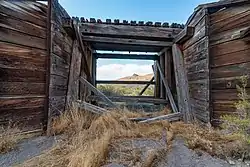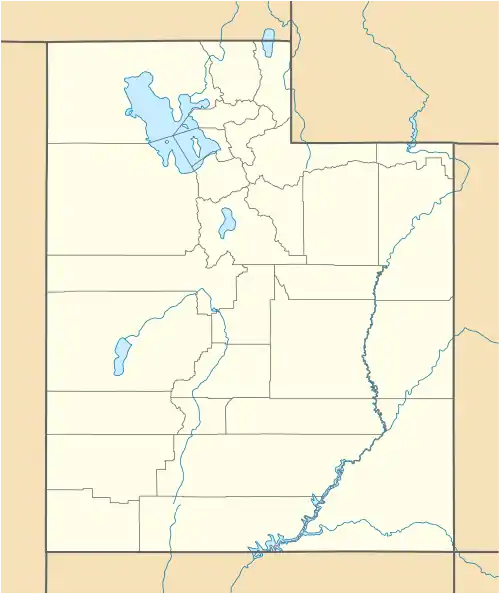Transcontinental Railroad Grade | |
 Railway trestle in the section | |
  | |
| Nearest city | Corinne, Utah |
|---|---|
| Coordinates | 41°36′55″N 112°20′40″W / 41.61528°N 112.34444°W |
| Area | 655 acres (2.65 km2) |
| Built | 1869 |
| NRHP reference No. | 94001423[1] |
| Added to NRHP | December 8, 1994 |
The Transcontinental Railroad Grade is a section of railway in northwest Utah, near Corinne, Utah, which was listed on the National Register of Historic Places in 1994.[1]
It is an abandoned 13.5 miles (21.7 km) section of the original 1869 grade of the first transcontinental railroad. Its raised grade (trackway), 11 trestles, and 21 culverts were built in 1869 or in years soon after. This section was built poorly by the Union Pacific, consistent with financial incentives, and was acquired by the Central Pacific in 1869, which found it necessary to replace trestles and otherwise rebuild the route here.[2]
The trestles were built largely with redwood, and have vertical round beams supporting stringers supporting railway ties. Just three of them were in good condition in 1992.[2]
The section runs roughly from 6 miles (9.7 km) miles west of Corinne for about 13 miles (21 km) further west along what is now Utah State Route 83. It is near Promontory Summit where the ceremonial golden spike was hammered in to complete the six-year project by three companies to build the transcontinental railway.[2]
See also
References
- 1 2 "National Register Information System". National Register of Historic Places. National Park Service. November 2, 2013.
- 1 2 3 Gail Van Moorleghem (May 1994). "National Register of Historic Places Registration: Transcontinental Railroad Grade". National Park Service. Retrieved August 18, 2019. With accompanying six photos from 1992
External links
- Historic American Engineering Record (HAER) documentation, filed under Corinne, Box Elder County, UT:
- HAER No. UT-64, "Promontory Route Railroad Trestles", 3 photos, 1 measured drawing, 28 data pages, 1 photo caption page
- HAER No. UT-64-A, "Trestle 788B", 6 photos, 1 data page, 1 photo caption page
- HAER No. UT-64-B, "Trestle 789B", 5 photos, 3 data pages, 1 photo caption page
- HAER No. UT-64-C, "Trestle 789C", 6 photos, 3 data pages, 1 photo caption page
- HAER No. UT-64-D, "Trestle 790A", 8 photos, 3 data pages, 1 photo caption page
- HAER No. UT-64-E, "Trestle 790B", 5 photos, 1 data page, 1 photo caption page
- HAER No. UT-64-F, "Trestle 790C", 6 photos, 3 data pages, 1 photo caption page
- HAER No. UT-64-G, "Trestle 791B", 5 photos, 3 data pages, 1 photo caption page
- Note: HAER No. UT-64-H is within the boundaries of Golden Spike National Historical Park